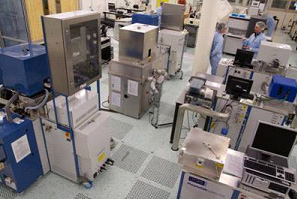The open-access facility for state-of-the-art nanotechnology-related research, NanoLab@TU/e in the Netherlands, continues to expand its capabilities, with the recent addition of two new Oxford Instruments plasma systems.
 NanoLab@TU/e, Image Courtesy of TU/e
NanoLab@TU/e, Image Courtesy of TU/e
"The PlasmaPro System100 RIE and PlasmaPro System100 ICP-PECVD tools are multi-purpose systems that complement the already existing tool set dedicated to the processing of III-V photonic devices, many of which are Oxford Instruments tools", said Prof Erwin Kessels, Plasma & Materials Processing Group, Dept. of Applied Physics, TU/e. "They strengthen our capabilities for our own research as well as that for our partners within the NanoLabNL initiative. They also complement the extensive ALD-capability of our clean room, that already contains the two FlexAL and one OpAL plasma and thermal ALD systems from Oxford Instruments."
Prof Kessels continues, "With the capability to run both F- and Cl- chemistries, the PlasmaPro System100 RIE tool will be used for "standard" processing of silicon-containing materials (SiO2, Si3N4, Si) as well as for etching more "exotic" materials such as NbN."
The etching of niobium nitride thin films is used to fabricate nanostructured superconducting single-photon detectors. For this application TU/e needed to define a ultranarrow (50 nm) constriction in a 5 nm-thick NbN film, by electron-beam lithography and etching with F-based chemistry.
When the resulting device is cooled down to 4 K and biased close to the critical current, a single-photon absorbed in the constriction region (and only there) gives rise to a superconducting-resistive transition, producing a voltage pulse. This results in a single-photon detector with a spatial resolution of few tens of nm, which could be used for near-field imaging with unprecedented sensitivity.
Mark Vosloo, Sales and Customer Support Director at Oxford Instruments Plasma Technology recognises the importance of this additional system sale, "Our broad, flexible and reliable system and process offering has lead to a number of nanotechnology research institutes globally becoming established as Oxford Instruments centres of excellence. Several long term relationships have developed between research centres and our Company, and TU/e is one of the establishments where we are delighted to collaborate. Our customers rely on our experience to provide the most advanced and innovative technology and service, to achieve their scientific goals."